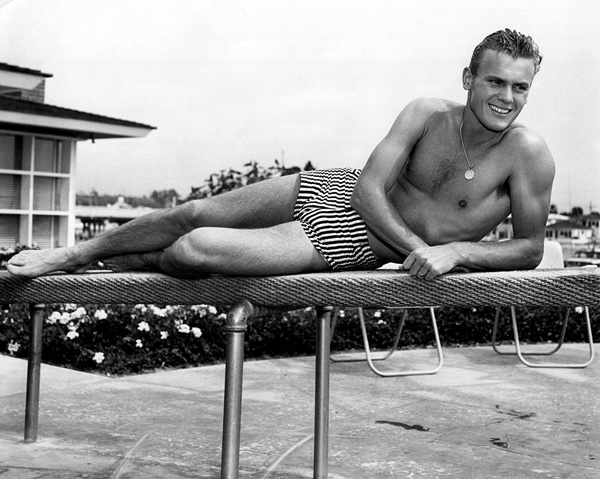Embarrassingly, the first Tab Hunter film I ever saw was Grease 2 (1982). He played the hunky biology teacher opposite his longtime costar Connie Stevens. It wasn’t until many years later when I saw him in John Waters’s Polyester (1981), and even then I didn’t really understand his pop cultural significance.
The documentary Tab Hunter Confidential traces the history and influence of the 1950s all-American idol. Director Jeffrey Schwarz, whose previous film was the exuberant documentary I Am Divine, examines Hunter’s struggles in Hollywood. He interviews Waters, Debbie Reynolds, George Takei, and Robert Wagner, among others, but he relies mostly on Hunter himself to tell his story as a gay actor working in Hollywood.
Hunter rose in the ’50s as Warner Brother’s go-to young star. His dashing good looks made him irresistible to his teenage girl fan base. The film lingers on headshots of the blond and blue-eyed Hunter, and they would make anyone swoon. Born Arthur Gelien to a single mother, Hunter was never very comfortable with all that fawning attention, even in high school. He knew early on that he was different than the other boys, and because a priest made him feel miserable and afraid, he abandoned the Catholic Church at an early age, an institution he genuinely loved.
As a Hollywood star, he had to hide his sexuality. The studio would set up dates and girlfriends for him, including Reynolds and Natalie Wood, while he had relationship with men (Antony Perkins). After leaving Warners for more challenging roles, Hunter’s star started to fade by the early ’60s. Acting only in B-movies for the paycheck, and eventually in dinner theater, Hunter was close to giving up on Hollywood.
That’s when Waters asked Hunter to play opposite Divine in his 1981 melodrama parody Polyester (which Schwarz also discusses in I Am Divine). This revitalized Hunter’s career, and he was again appearing in films, including Grease 2. It is around this time he also met his longtime partner, producer Allan Glaser. Hunter eventually decided to leave Hollywood completely. He currently lives a quiet life with Glaser.
Tab Hunter Confidential is a very typical biographical documentary, complete with talking heads and a constant stream of still images flying across the screen. In terms of the narrative, the film doesn’t take any risks or demonstrate much imagination. What saves this film is Hunter himself, who is so incredibly likable it’s easy to see why he became such a heartthrob. He’s so genuine and matter-of-fact that viewers will feel like they are just hanging out with him, hearing his life story.
It’s an exceptionally compelling story, too. He not only represents the struggles of gay men and women in Hollywood but the hardships of an actor in the studio system in general. The film also touches on his complicated relationship with religion and his advocacy for mental health, due to his mother’s health issues. There are so many fascinating aspects to Hunter’s story that the film would have benefited from examining some of these key issues more closely. However, Hunter explicitly states that he never wished to discuss his private life with the public, and the film seems to be torn regarding how deep to delve into his past.
Nevertheless, the film will make you want to take a closer look at some of Hunter’s early films, such as Gunman’s Walk and Damn Yankees (both 1958). He couldn’t seem like a nicer guy, as evident by the gushing talking heads that sing his praises.

















Leave A Comment